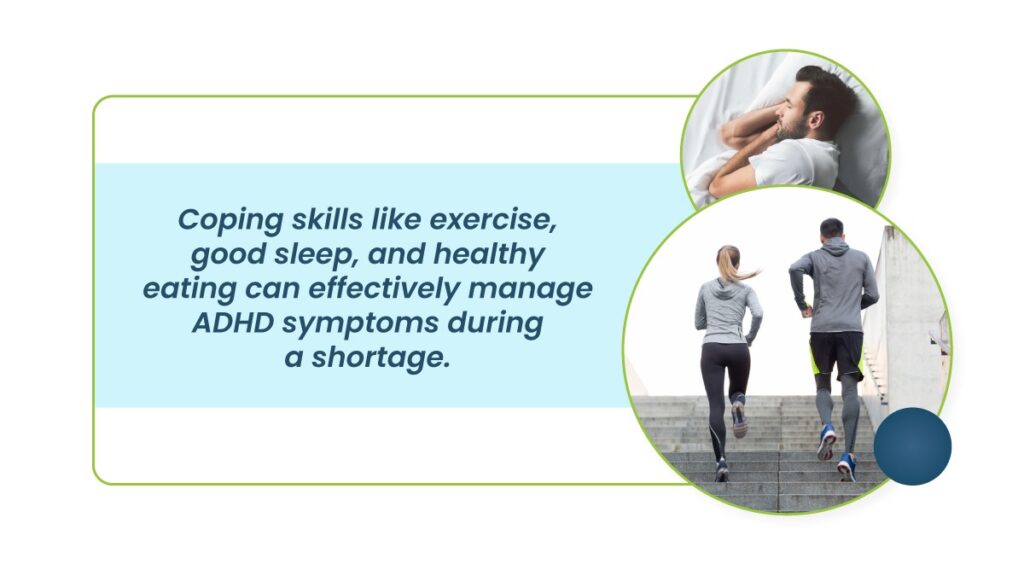
Dealing with Attention Deficit Hyperactivity Disorder (ADHD) can be challenging, mainly when you rely on medication to manage symptoms. Adderall, approved by FDA, is a commonly prescribed medication that is used to treat ADHD.
However, unfortunately, shortages can occur, leaving many young people struggling to find alternative ADHD medication. If you are one of the many individuals affected by an Adderall shortage, take comfort in knowing there are several ways to manage ADHD symptoms without Adderall.
Keep reading to explore how to cope with Adderall shortage and ADHD management.
Key Takeaways
In 2020, the Drug Enforcement Administration (DEA) made a more generic version of Adderall because demand was too high. Here’s what you need to know about how to cope with Adderall shortage and ADHD:
- When facing an Adderall drug shortage, there are alternative ways to manage ADHD symptoms.
- Coping skills like exercise, good sleep, and healthy eating can effectively manage ADHD symptoms during a shortage.
- Establishing a routine, creating a support system, staying organized, and practicing self-care can help manage ADHD symptoms.
- Talking to healthcare providers and making lifestyle adjustments can help.
If you or someone you know is struggling with ADHD or coping with Adderall addiction, don’t hesitate to contact The Haven Detox-South Florida for support and guidance. Call us at (561) 328-8627 today to learn more about our addiction treatment.
Understanding the Impact of Adderall Shortage on People with ADHD
The short supply of the brand name Adderall can potentially impact people with ADHD. When someone needs their Adderall prescription but can’t get them, they may feel uneasy. They may have trouble paying attention, feel more nervous, and have other problems associated with dopamine underproduction.
Strategies for Coping with Adderall Shortage
When facing an Adderall nationwide shortage, it’s crucial to explore alternative ways to manage ADHD symptoms. Talking to healthcare providers and making lifestyle adjustments can help. Coping skills like exercise, good sleep, and healthy eating can effectively manage ADHD symptoms during a shortage.
If you experience an Adderall shortage, there are several strategies you can try to manage your ADHD signs. These include:
- Reach Out to Your Doctor: Your doctor may have alternative ADHD treatment options or be able to help you find local pharmacies that have an Adderall drug in stock.
- Switch to a Different Medication: Your doctor may prescribe different stimulant medications to manage your ADHD symptoms, such as Ritalin or Vyvanse.
- Consider Alternative Treatments: Some people with ADHD succeed in alternative treatments, such as cognitive behavioral therapy, exercise, meditation, or a healthy diet.
- Adjust Your Lifestyle: Making changes to your lifestyle can also help manage ADHD symptoms. Regular exercise, a healthy diet, and enough sleep are essential to managing ADHD.
To sum up, it can be hard to deal with the current shortage of Adderall, but there are other real solutions to control your ADHD. Talking to your doctor about what you can do and thinking about changing your daily routine is an excellent idea to help you feel better.
Lifestyle Changes for People with ADHD
Dealing with ADHD can be challenging, but there are coping mechanisms that can help manage symptoms. Here are some non-medication treatments to consider:
- Establish a Routine: A daily routine can help create structure and stability, which can help manage ADHD symptoms. Try to schedule your day with regular meal times, exercise, and work or study periods.
- Create a Support System: A support system can be incredibly beneficial for managing ADHD symptoms. This can include family members, friends, or a therapist who can offer support and encouragement.
- Stay Organized: Adults with ADHD often struggle with organization, which can cause stress and anxiety. Find a system that works for you, such as color-coded calendars, to-do lists, or daily reminders.
- Practice Self-Care: Practicing self-care is essential for managing ADHD symptoms. This can include getting enough sleep, eating a healthy diet, exercising regularly, and finding ways to relax and unwind.
In conclusion, coping with ADHD can be a challenge, but establishing a routine, creating a support system, staying organized, and practicing self-care can help manage symptoms. Remember to be patient and kind to yourself and seek support when needed. With time and effort, you can learn to manage your ADHD and make fulfilling and sober daily lives.
Seek Professional Help
If you’re struggling to manage your ADHD symptoms, it may be time to seek professional help. Here are some ways to get started:
- Finding a Therapist: A therapist who specializes in ADHD can help you learn coping strategies and provide support. Look for a therapist who is licensed and experienced in treating ADHD.
- Joining a Support Group: Joining a support group can provide a sense of community and help you connect with others who understand what you’re going through. Look for local support groups or online communities.
- Getting a Comprehensive ADHD Assessment: A comprehensive ADHD assessment can help you get accurate ADHD diagnoses and determine the best treatment plan. This assessment may include interviews, questionnaires, and testing.
In addition to that, it’s essential to seek professional help if you’re struggling to manage your ADHD symptoms. Remember, there is no shame in seeking help, and it’s a sign of strength to take control of your health.
Frequently Asked Questions (FAQ)
What to do if you run out of your ADHD meds?
If you run out of your ADHD medication, reach out to your doctor or pharmacist right away. They may be able to provide you with a refill or suggest an alternative drug to manage your symptoms.
It’s important not to stop taking your prescription medication abruptly, as this can lead to withdrawal symptoms and other negative side effects. Stay in communication with your healthcare provider and follow their guidance for managing your symptoms of ADHD without similar medications if necessary.
How long will the Adderall shortage last?
It’s difficult to say how long the nationwide Adderall shortage will last, as it can depend on various factors such as supply and demand, manufacturing issues, and regulatory factors. It’s important to stay in communication with your healthcare provider and pharmacist to stay informed about the availability of your medication.
They may be able to provide you with updates on the situation and suggest alternative drug options if necessary. Keep in mind to be patient and proactive in managing your ADHD symptoms like mood swings during this time.
What is causing the Adderall shortage?
A combination of factors such as supply chain disruptions, manufacturing crises, and increased demand for medication causes the nationwide shortage of Adderall. The COVID-19 pandemic has also had an impact on the availability of certain medications, including Adderall.
Additionally, regulatory factors can also play a role in the availability of certain drugs. It’s vital to communicate with your healthcare provider and pharmacist for updates and explore alternative options for managing your ADHD symptoms if necessary.
Take Control of Your Life with The Haven Detox-South Florida
If you or a loved one is struggling with addiction and mental health issues, The Haven Detox-South Florida is here to help. We offer a range of services to support your recovery journey, including detox, residential treatment, and support for co-occurring mental disorders and addiction.
Our team of experienced professionals is dedicated to providing personalized care that addresses the unique needs of all patients. We also offer specialized services to help manage stress and addiction and support for those seeking SMART Recovery.
At The Haven Detox-South Florida, we believe that recovery is possible and are committed to helping you achieve your goals. Whether you are just beginning your journey or looking for additional support, we offer a safe, comfortable, supportive environment where you can focus on healing and growth.
Don’t wait to start your recovery journey. Call us at (561) 328-8627 today to learn more about our services and how we can support you in achieving a life free from addiction.






